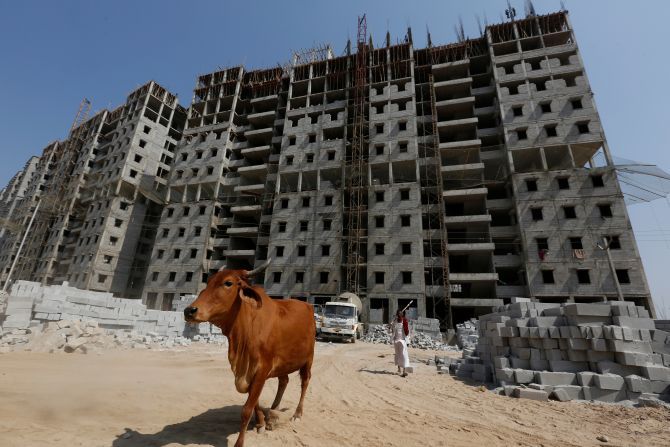 | « Back to article | Print this article |
A host of dynamic reforms, policies and announcements during the last five years are expected to reach its logical fruition in the second term, says Ankit Kansal.

The National Democratic Alliance government in its first term is credited for introducing some game-changing measures to vitalise and boost the Indian real estate industry.
Policy overhauls such as Real Estate (Regulation and Development) Act (RERA), demonetisation, Real Estate Investment Trust (REIT) and Goods and Services Tax (GST) have been instrumental in bringing more transparency in the realty sector, that was, so far, vastly unstructured.
The government has also facilitated investments into the infrastructure sector in the form of affordable housing, smart city plan, industrial corridor, logistics facilities among others.
After winning the 2019 election with a clear majority, it is evident that in its second installment, Modi 2.0 will continue to strengthen its initiatives along with undertaking broader reforms for the industry.
Real estate sector is already undergoing a revival, as transaction volumes have picked up Y-o-Y to the tune to 45-60 per cent in major cities.
Going forward, this will further instill confidence in the sector and contribute to building consistent momentum.
Under a stable and strong government, real estate is poised to grow further.
Growth of real estate is underpinned on an upbeat economy
A stable government at the centre is expected to give a boost to the economy and facilitate more foreign funds inflows into the country.
This growth impetus can probably be borne out with the Sensex crossing the historic 40,000 mark.
Analysts and industrialists alike feel that the government will take stronger policy steps to reform the economy and aid growth.
Its thumping victory in the election will provide additional motivation to the government to put stronger reforms in place.
In its election manifesto, the government has pledged to give cash handouts to farmers, spend over $ 1.4 trillion to develop infrastructure and double exports.
Such proactive plans in conjunction with tax benefits to the middle class can boost the economy and reverse the recent slowdown in consumer spending.
A healthy economic outlook will also revitalise the real estate industry and result in heightened demands.

Institutional investors will continue flocking to the realty sector
Over the past few years, with the implementation of wide-ranging policy reforms such as RERA, demonetization and GST, real estate has started to feature high on the radar of institutional players.
Out of the $ 30 billion of institutional money that has come during 2009-2018, over 65 per cent has been invested in the last four years.
Interestingly, around 70% of this capital has emanated from international sources.
A stable government will further instill confidence among international and domestic investors and propel them to make investments with greater optimism.
It is expected that the institutional deal inflow will double in the foreseeable future.
NRI investments will get a shot in the arm
In FY 2018-19, non-resident Indians (NRIs) have poured around $ 11 billion into the Indian housing industry, as per estimates by 360 Realtors.
The spurt in NRI funding is also attributed to the host of reforms and policy makeovers taken by the government to create a conducive economic ecosystem.
With Modi's thumping majority in parliament, NRI investments inflow will further get a shot in the arm on the back of a marked increase in confidence.
A dip in the value of the rupee will further incentivise investments by NRIs and drive them to cash in on richer dividends.
Vigorous policy rationalisation
The government will focus on streamlining the implementation of RERA in the country by taking additional steps to simplify the process.
The industry has been waiting for faster/single window clearance for a long time and the new government should take proactive steps in this direction.
A faster window will help in rationalising the cost of development and make real estate more affordable.
The government should take initiatives to redress the recent Non-banking financial company (NBFC) crisis that has severely impacted the flow of developer funding in the country.
Despite the recent revival in the market, real estate suffers from a huge pile of unsold inventory and delayed projects and hence requires systematic intervention from the government and regulatory bodies.
The industry also expects rationalisation of taxes by merging stamp duty under GST.
This will give a further push to the industry by bringing down the cost of development.
More focus on affordable housing
In 2015, the Modi government announced that by 2022, housing will be provided to every citizen in India.
The government pledged to build 29.5 million new rural homes and around 12 million urban homes.
As the government has been re-elected, the housing for all scheme will witness an increased pace towards achieving its planned objective.
If not in 2022, then at least by 2024, this ambitious plan will reach its fruition.
However, the government needs to stay committed to effectively make this goal a reality.
Similar to the affordable housing projects, the ambitious smart city plan has been incubated in the first term.
It is expected that the plan will receive continued efforts from the government to reach its logical conclusion.
Ankit Kansal is MD & CEO of 360 Realtors
Photograph: Rupak De Chowdhury/Reuters